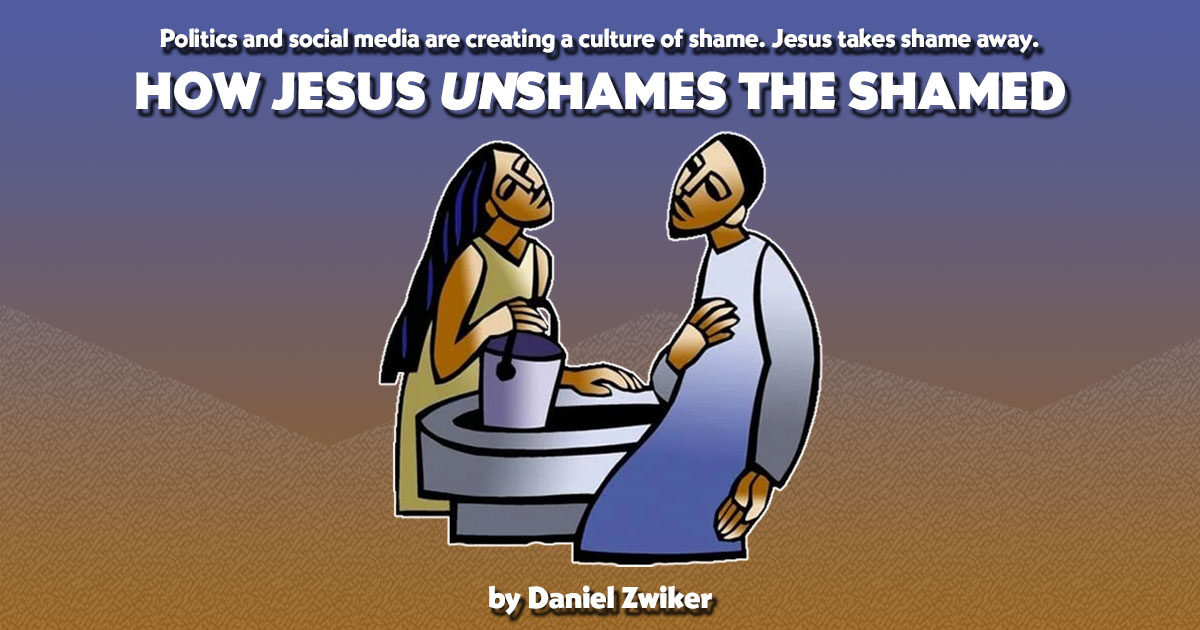How Jesus UnShames the Shamed
by Daniel Zwiker | 11 March 2025 |
A discussion is going on right now among sociologists about whether the Western culture of guilt is developing into a culture of shame.
Guilt is feeling bad about something we’ve done, while shame is deeper than that: it is about what we believe we are. The Western culture has been characterized by the demand that we do the right things, with guilt the result if we don’t. In Oriental and African cultures, questions of honor and shame seem more prominent.
But something has changed in Western culture. I can’t get used to the shamelessness with which people nowadays shame others. Some politicians refuse to engage in a discussion of issues, and instead deliberately trash people’s dignity. They instrumentalize people to serve their goals. (I am even more surprised that these politicians receive serious support in a democracy despite blatant lies and cruelty.)
Social media is a contributor. Normally-conscientious people will use cruel language against those they disagree with. They don’t have a face in front of them while they write, and the facelessness of the medium disinhibits them. If they could look the person in the eyes, perhaps they would hold back.
In a culture of shame, humiliation and insults are employed to violate the dignity of the shamed. These hurts start a vicious cycle: they lead the shamed to shame others. No wonder it takes three to four generations for a people humiliated by war to regain relative psychological balance!
We intuitively avoid people who seem to lack shame entirely—they seem impudent. Yet, says Daniel Hell, Emeritus Professor of Psychiatry at the University Hospital in Zurich in his book In Praise of Shame, “Only those who respect themselves can be ashamed.” Real shame requires that we recognize a sense of dignity. There is no culture, no people, no era, in which shame and dignity do not play a major role, even if their expression varies greatly. Shame and dignity are deeply interwoven into human existence.
Shame and self-knowledge
In the first chapters of the Bible, Adam and Eve hide in the bushes because they ate from the tree of knowledge. They experience shame for the first time, and their eyes are opened. They become aware that they cannot simply play in this wonderful garden without a care in the world. God is judging them from the outside.
Developmental psychologists say that a child begins to understand shame when it recognizes itself in the mirror—that is, when it sees itself from the outside. Shame requires recognition. Without self-recognition there can be no shame. Before sin, Adam and Eve had not been bothered by their nakedness—until they realized who they were from the outside. Sin held up a mirror to them. They feared being judged negatively by God, and they hid.
Shame is one of the most unpleasant emotions a person can feel. It makes our faces red, our hearts pound. One who is ashamed is affected in the deepest part of themself. No wonder many people avoid this feeling!
Sometimes people cover their faces with their hands because they don’t want what their face is saying to be recognized. They can’t withstand the gaze of another. As a listener, I respect this and turn my gaze elsewhere.
Prudishness—an overly sensitive narrow-mindedness toward customs and morals—is one strategy for dealing with one’s own shame. A related strategy is projection, which Jesus spoke about: “Why do you see the speck in your brother’s eye, but you do not notice the plank in your own eye?” Projection begins a cycle of violence: hurting and shaming others out of one’s own hurt.
Fear, anger, and disgust are basic emotions that protect us from dangers that come from outside. Similarly, guilt reminds us that we are not living up to the expectations of others, society, or God. But shame is not the same kind of emotion as these. It says that something is wrong deep within us. We are not living up to our own ideals.
Some shame is important for our brain development. When we feel ashamed, we learn to deal with possibly embarrassing situations more constructively. At the beginning of the pandemic, I forgot to take my mask with me on the tram and I was looked at by many questioning eyes. Today we deal with this question a little more casually, but back then I hid in the back of the tram and covered my mouth with my hand. I was ashamed because I didn’t want to unsettle the other passengers. From then on, I never forgot to take the mask with me on the train, as long as the authorities required it. This experience created new neural connections for me.
God & shame
Adam and Eve’s experience is usually interpreted from the perspective of guilt rather than shame. Yet shame and guilt are often intertwined. While guilt relates to the external, to our actions, shame goes to the core of our personality.
How does God react to the first two people in hiding?
First, he looks for them. He goes exactly where Adam and Eve are. We sometimes shame people without having the courage to go where those people are. It’s easier to talk about them from a distance, judge them, condemn them, or give them advice.
Then God asks: “Adam, where are you?” That means: “What are you experiencing? How are you doing? What drives you?” Highly therapeutic questions! Adam can’t find words. He diverts the conversation. “The woman you gave me, God….” It is easier for him to blame others—his wife and God—than to talk about himself. Eve reacts similarly: “The serpent deceived me….”
The inner conflict from shame is sometimes so great that a person simply needs some protection. God wants to offer them a protective space in which they can look themselves in the eyes and find words to describe their conflict. Perhaps that’s why God gives both of them garments: when we are shamed we need protection while we find the courage to face our shame.
It is interesting to see how quickly shame led to a culture of revenge in biblical prehistory. There is a lot of shame and a demand for honor in Old Testament narratives. These sentiments could take religious forms, such as when Job’s friends shamed him in long theological discourses because of his misfortunes, and doubted his religious integrity. Job emphatically defended himself, and God acknowledged him.
Jesus unshames the ashamed
Does Jesus simply take away our shame? No. Jesus deals with shame constructively. Jesus does not merely disinhibit people. He carefully unashames the shamed. Jesus breaks the vicious cycle by giving people a space in which their dignity is protected despite their shame.
The Sermon on the Mount is the charter of the Kingdom of God in that it describes the foundational values of Jesus. Daniel Hell puts it this way: “The Sermon on the Mount is a single beatitude for the ashamed of that time.”
The Greek term makarios, “blessed,” is used in Greek literature to describe, among other things, a woman whose husband has achieved something very important for the community. As she walks through the market square of a city she stands upright. Her posture expresses dignity.
So in the Beatitudes “blessed” could be translated as “stand up!” This is how God’s children can move in this world: “Arise, you who hunger and thirst for righteousness, for you shall be filled.” It is worth reading the Beatitudes from this perspective.
What strikes me is what dignity Jesus displays in his encounters with every person who addresses him. Perhaps it is no coincidence that Jesus’ encounters with women come first to mind: women have been shamed so often by men.
A shady woman publicly washes his feet with expensive oil, a huge investment at the time. The men around him are embarrassed by this woman’s presence. The woman surrenders to her tears; she is emotional, maybe even—from the men’s perspective—hysterical. The scholars want to talk to Jesus about theology. It is amazing how a relaxed Jesus handles the situation. The scholars shamed the woman, but Jesus unshames her and restores her dignity.
A suffering woman comes up to him. She just wants to touch Jesus. There is something magical about that expectation. Again, those around him are embarrassed, whispering. The disciples are frankly annoyed and want to protect Jesus from this whining woman. But Jesus deals with her calmly and with respect. He publicly gives her the attention she needs, and with it the dignity to face society.
The disciples want to spare Jesus from noisy children. Jesus welcomes them and shows them affection.
Jesus has the courage to address the woman at Jacob’s well who, in order to avoid the shameful gaze of the village, only dares to go to the well under the blazing heat of the sun.
An adulteress is about to be stoned by the shaming Pharisees. Jesus confronts these men with their own shame. They let their stones fall into the dust. Jesus then restores the woman’s dignity in just a short conversation.
But men are also affected by shame. Zacchaeus made a career of fraud, and became rich by it. He is ridiculed when he clumsily climbs a mulberry tree to see Jesus, because his longing for dignity is stronger than his fear of shame.
Shame and dignity
I sometimes wonder why Western theology talks more about guilt than about shame. The shame perspective opens up a wide field of questions about soteriology, the understanding of sin, victim theology, and anthropology. The question of perfectionism wouldn’t even come up.
Jesus’ environment shamed, but Jesus unshames the shamed. Jesus gives them back their dignity, often in public: calmly, with touching attentiveness, and without losing his own dignity. With Jesus there is no embarrassment!
And indeed, anyone who meets people with sensitivity and accompanies them in their pain will meet people who have been shamed and long to be unashamed, people who need a listener—someone who gives them access to their dignity with words and kindness.
I sometimes wonder whether followers of Jesus are more like shamers or unshamers, and to what extent they bring people mindfully into contact with their dignity as children of God.
How heaven unshames
God looks for people in their shame. He goes to where they are. He starts the conversation and helps heal their turmoil. It gives them an external as well as an internal protective space. He asks: “Where are you?” and gives them protective clothing that gives them a certain level of security.
Jesus knocks softly on our door. He treats us with respect and tact. He unshames the shamed in dignified encounters. Things never get awkward with Jesus.
I would like to orientate myself to heaven’s dealings with those who are ashamed.
 Daniel Zwiker is a practicing psychotherapist and a theologian. He was chairman of the Psychology and Faith Network of the United Bible Groups (Vereinigten Bibelgruppen) in Switzerland, and a member of the advisory board of Insist Consulting GMBH.
Daniel Zwiker is a practicing psychotherapist and a theologian. He was chairman of the Psychology and Faith Network of the United Bible Groups (Vereinigten Bibelgruppen) in Switzerland, and a member of the advisory board of Insist Consulting GMBH.




